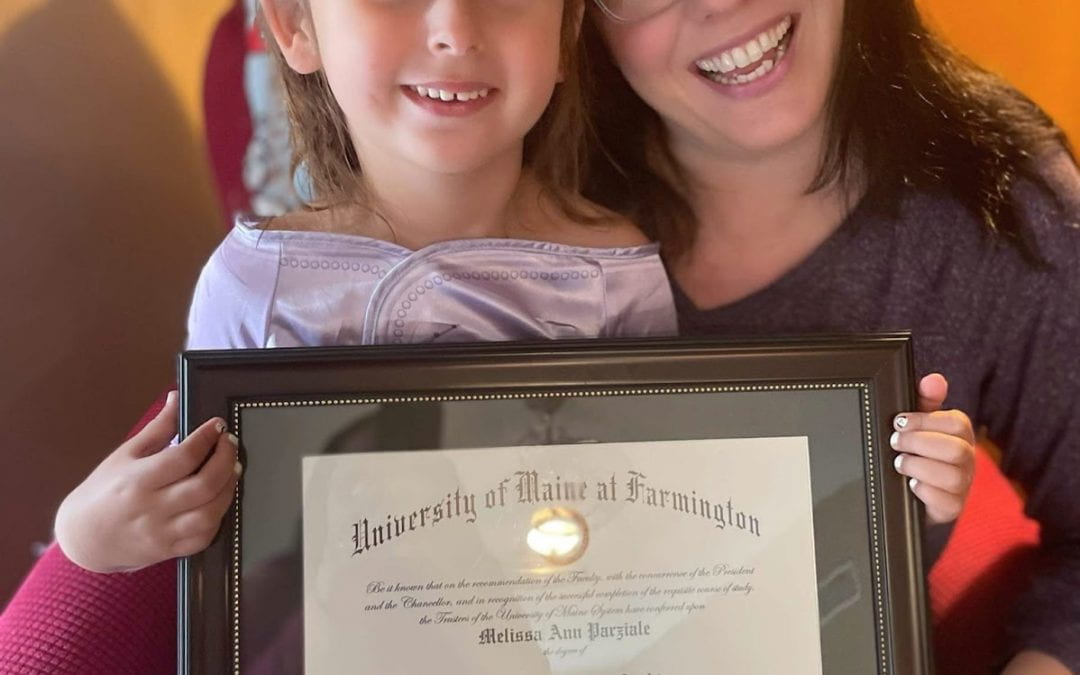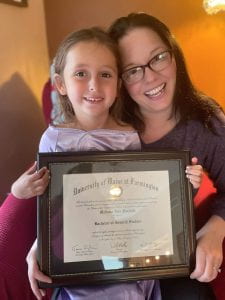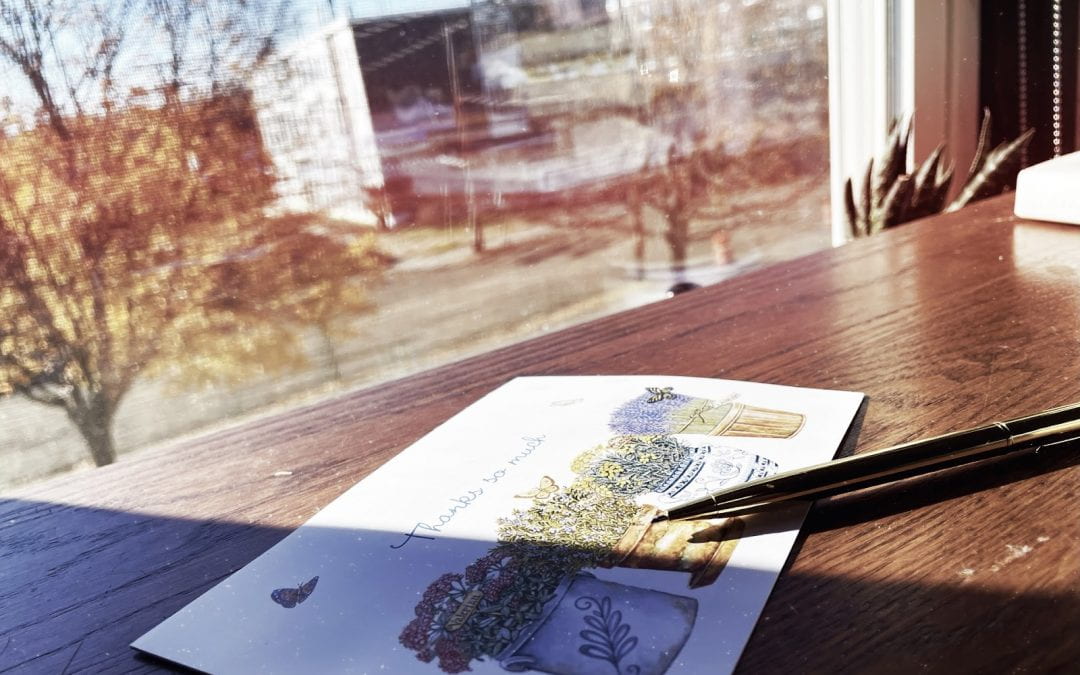Dec 16, 2021 | Exclusive, Feature, News |
By Michael Levesque, Contributing Writer
Recent construction on High Street addresses an important area of campus but some students feel a little unsure about how to navigate the project.
At the end of October, construction began on a section of High Street from Perham Street to South Street. This area of road runs directly through the center of campus at UMF. For some students, the construction has created a bit of surprises as they make the trip to their classes. Paige Lusczyk, a student at UMF notes some confusion about where students were permitted to walk. “I wasn’t sure if I’d get in trouble with crossing the road while they were working and was late to class by walking around the blocked off road,” she said in an email. “I don’t really hear much of the construction, even with my windows always open,” she said. Although Lusczyk doesn’t note the sound as contributing to the construction drawbacks, other students have. Zack Laflamme, a junior at UMF, says that Francis Allen Black Hall has been affected less by noise from construction but has heard about complaints from the noise through social media. “I live in FAB, so I don’t hear it much but I’ve seen my friends say on their Snapchat stories how loud or distracting the noise is,” Laflamme said. Most students note that noise hasn’t been a terrible issue and that they will get used to the new scene on campus. “I haven’t found the construction all that frustrating,” said Lusczyk.
High Street’s location to UMF means careful planning must be implemented for the members of the community. Philip Hutchins, the public works department head for Farmington, has noted the goals and plans of this project. “The High Street project will last until 2022,” he said in an email. “This is split up in two phases. The roadway pave portion will be completed this fall; which will soon be open to traffic again,” said Hutchins. “[In] the spring of 2022, we will commence on the outside of roadway construction.” Many assets are expected to be added to the area around UMF in the spring. “An addition of over 30 new street lamps, new sidewalks, curbing and more parking accessibility, such as bus turn-outs for campus activities [will be added],” said Hutchins.
Hutchins understands the possible confusion and magnitude of the project. “I ask for everyone’s patience until the project is completed,” he said. As part of a “full depth reconstruction” project listed on the public works department website, the expected cost of this project is $300,000.“This project is funded by local municipal government and by the Maine Department of Transportation,” Hutchins added. As many people look forward to a potentially more quiet section of road, others look towards the improvements in the future. “This project will give the area a whole new welcoming and warming look”
Dec 16, 2021 | Feature, News |
By Sophia Turgeon, contributing writer
UMF will be implementing a new curriculum and credit system in the fall of 2023; the Board of Trustees of the University of Maine System approved the campus to alter from a four-credit system to a three-credit system.
This system is one that many University of Maine System schools use, but it comes with a catch. Currently, full-time students take four classes a semester and earn a total of 16 credits (four credits per class). Beginning in September 2023, full-time students will need to take five classes to earn a total of 15 credits (three credits per class).
The overall intention of this change is to match UMF’s curriculum with other University of Maine System schools. This will allow UMF to begin increasing the amount of collaboration between other schools in the system. Additionally, it is also intended to make the transfer of students to UMF easier.
Provost and Vice Principal of Academic Affairs at UMF, Eric Brown, believes that students should not be too alarmed by this change. Program requirements will remain the same for students and the amount of credits needed to graduate will be decreased to accommodate this curriculum. With that being said, UMF faculty is currently reshaping their classes in order to account for the reduced amount of time spent in the classroom.
“No students should be adversely affected by this change in terms of program requirements or path to graduation,” Brown said. “And for many current students the change will likely mean a slightly lower cost for their UMF education, since they will only need 120 rather than 128 credits to graduate,” Brown said.
Brown also admitted that though this shift may be difficult, it will not be disastrous. “… there is time to adjust and anticipate what the changes will look like,” Brown said. “I was here at UMF when we shifted from 3-credits to 4-credits and the adjustment didn’t happen overnight. But at some point it will become a new normal.”
When it comes to students wishing to transfer to UMF, Brown trusts that this credit system will make the transition much smoother. According to Brown, more than half (55%) of the transfer students at UMF that were surveyed confessed that they had lost credits during their transition to UMF. Moreover, 45% reported being required to take more classes than they had initially planned.
“One of the primary reasons for making this change is actually to better align our curriculum with all of the other University of Maine System schools,” Brown said. “This will facilitate one of the System’s strategic goals in the coming years—more multicampus collaboration and more seamless movement for students between and among campuses. But what makes UMF special, in my experience—the close and authentic bonds between faculty and staff and students—will not change. And no one anytime soon will mistake Farmington for Portland or Presque Isle.”
When considering the kind of school UMF is, Brown believes that UMF has always been an amazing university for students to attend, even before the switch to a four-credit system. “UMF was a fantastic school before we switched to a 4-credit curriculum and will continue to be so once we have switched back to a 3-credit model,” Brown said. “It doesn’t mean the transition will be easy or always graceful but the core mission and values of this place will maintain. It really is a rare opportunity to reimagine our best practices collectively as an institution, and to continue to improve upon our well-established record of student success. And I do believe we can emerge stronger as a university once we are on the other side of the work to get us there.”

Dec 16, 2021 | Exclusive, Feature, News, TopStory |
By Charity Webster, contributing writer

(Photo Credit Melissa Pariziale) Melissa and her daughter Mia
Becoming an alumni is what every student wants, but often life throws curve balls at the student which changes the course of life and causes them not to complete the task. UMF has started an amazing opportunity for those students that have struggled to complete their degrees for one reason or another. A program called “Almost Alumni” helps these individuals finally finish their degrees.
Ashley Montgomery is the Assistant to the Dean, Learning and Assessment at UMF, and she is the driving force of Almost Alumni. She also chairs the academic success team which monitors and works with students who are struggling currently at UMF. These “Almost Alumni” individuals are having their transcripts reviewed. If it is possible to complete the degree they will support these individuals through the process.
In the beginning, when Montgomery was attending a meeting with others involved in upper-level education, she really had not put much thought into UMF having a large number of Almost Alumni or stop students (as they are called elsewhere). “Our numbers for adults (24+years old) is very minimal and the majority of the UMF population tends to be of a traditional age,” said Montgomery. Typically, more than half of a class finishes the degree in a normal college timeline. What happens to the rest of them? UMF has stepped up to find them and help support them through what is missing. They are committed to the success of the non-traditional student. They are even willing to pay fines and find resources to pay for books and other college expenses. “They will even research more local colleges for the student to make the transition and completion easier.” said Melissa Parziale, Graduate from Almost Alumni.
“Almost Alumni have delivered 20+ diplomas to students who never had the opportunity to finish their college degree over the last year, each time I was almost in tears from so much joy.” Montgomery said.
Montgomery has sifted through hundreds of past students and selected students that she is approaching to develop a plan to finish. When asked if there was financial support for these students, the answer was there are funds that can help Almost Alumni complete their projected course of study.
Melissa Parziale is one of those students who was approached by Montgomery and only needed two classes to graduate once they reviewed her transcripts and changed her major to General Education. “This phone call and opportunity came at the perfect moment in my life. During COVID, I had lost my job and I was training for Human Resource Management and Leadership, I was so shocked I was receiving an email saying I was close to finishing my Degree” said Parziale. Twenty-eight years after starting her degree at UMF, she finally finished her degree in July of 2021. She proudly hangs it on her wall in her office at a Dental Lab where she is the Director of Human Resources.
For some individuals, graduation is even easier than anticipated. “For some it might be just switching majors and immediately getting a diploma, and for others it might be just one class to completion” Montgomery said. There are a lot of students in the system who have a degree right now and don’t even know it, some just because they never applied for their diploma. Also, they may have been enrolled in the program a while back and the requirements have changed. “These are the easy diplomas,” said Montgomery.
“If I could tell everyone to go back and finish I would, it was what I always wanted to do and Ashley supported me through it every step of the way. Reach out to her and finish,” said Parziale. “I wanted my daughter to know that she can do anything and to never give up on your dreams.”
Contact Information: Almost Alumni Ashley Montgomery Assistant to the Dean, Learning and Assessment at UMF ashleym@maine.edu

Dec 16, 2021 | Feature, News, TopStory |
by Angie Tehuitzil Corral, staff writer
Thanksgiving season is around the corner, and it is the time of year where there is a certain sense of warmth and fullness as we are all thankful for what we have and the loving bonds we share with our family, friends, partners, etc. – being grateful is simply a part of the season.
Last week my psychology professor informed my class of a group of studies happening on campus, and as a psychology major, I was highly interested in volunteering. Although I appreciated all the studies conducted, one stood out, and I had discerned that my attitude had changed positively.
The study was The Practice of Gratitude, done by researcher Seán Tenney, a second-year UMF student majoring in psychology. It was a 20 minute experiment in which Seán began with discussing the psychology of gratitude and then began with participants completing a personal well-being questionnaire that would serve as pre and post-tests results for the experiment. After the pre questionnaire, participants had to write a letter within 5-8 minutes to someone they hadn’t properly given them the gratitude they deserve.
There is no denying that when I first received the paper, I was clueless about who I’d write it for, but it wasn’t long until the letter wrote itself. My verdict after the research was that I had unraveled a profound depth of happiness. The effect that the study had on me invested me in wanting to know more about it. So I decided to meet with Seán.
The study conducted was for his Psych 400 class, with his finalized hypothesis: “participants who write a message of gratitude for someone in their life who they haven’t adequately thanked will experience a positive increase in multiple dimensions of personal well being”.
I further asked Seán what his inspiration behind this study was as I was fascinated by how well-planned and effortless the experiment went. However, Seán revealed that it wasn’t easy, as he was initially distressed about what his study would be, but then found himself genuinely influenced by a memory from three years ago. A wearying night in which he encountered an old yearbook; it possessed an astonishing message from a former classmate with whom he didn’t have much connection.
“From the end of October to early November, I just felt detached, disconnected, and even questioned my life, but the letter from this former classmate was a moment of transformation; the kindness of her words grounded me back to earth and I barely even knew this person,” said Seán.
Seán then decided to send a touching message to his classmate, expressing to her that such a simple yet “compelling gratitude message in black ink” had enlightened him. And this hasn’t ended for Seán as he continues sending letters to various people.
Other studies have proved measurable benefits, showing the positive psychology behind an act of gratitude through its impact being the “most effective psychological and spiritual practices for enhancing overall well-being”. For example, a group of researchers who had done a similar experiment as Seán in a University in the Midwest concluded that “one of the greatest gifts is giving” and explained many underestimated self benefits. Practicing such a small act increases energy by boosting well-being behaviors -such as finding and influencing better care for one’s body, making smarter daily decisions, having better social relationships, being a more optimistic person, and it’s even the healthiest form of treatment that has a substantial influence on those with mood disorders. Even through Seán’s interpersonal experience, we can see that being grateful not only uplifts the person you’re being thankful to but also helps with your own welfare.
I encourage you to partake in this research by simply writing a gratitude letter. Even if you don’t give it to the person, keep it as an inspirational reminder of why you work as hard as you do. We spend most of the time thinking about what we don’t have, but happiness doesn’t mean having everything; instead, it is about being thankful for what you have and those who have made it possible for all that you’ve acquired.
Sources
https://journalppw.com/index.php/JPPW/article/view/256/99
\https://time.com/5026174/health-benefits-of-gratitude/


